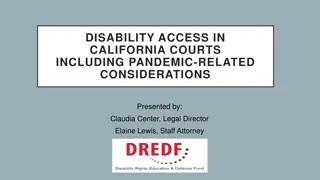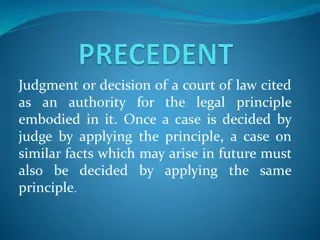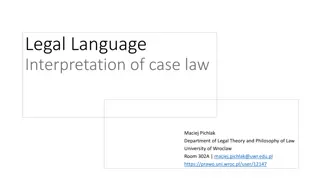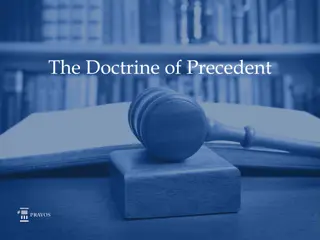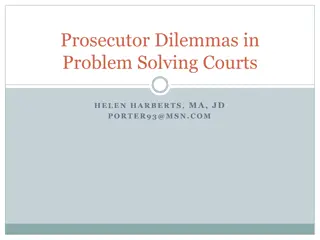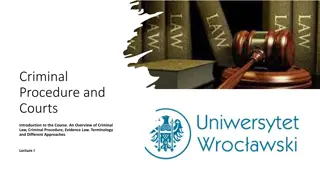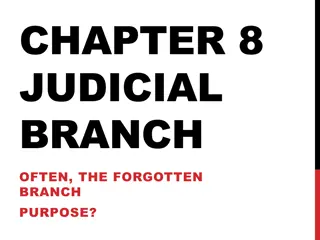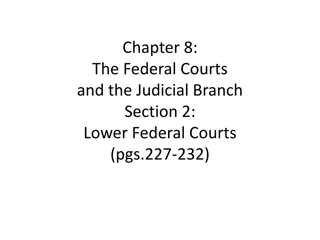Overview of Courts and Legal System in Greece
The legal system in Greece is structured around ordinary and special courts, with judicial power vested in the courts of law. The system includes ordinary civil, criminal, and administrative courts, along with special courts for specific cases. The three jurisdictions - civil, criminal, and administrative - are separated according to the Greek Constitution. Different types of courts, such as justices of the peace, one-member district courts, and three-member district courts, handle various civil matters. Appeals are heard by courts of appeal, which sit in panels of three judges.
Download Presentation

Please find below an Image/Link to download the presentation.
The content on the website is provided AS IS for your information and personal use only. It may not be sold, licensed, or shared on other websites without obtaining consent from the author.If you encounter any issues during the download, it is possible that the publisher has removed the file from their server.
You are allowed to download the files provided on this website for personal or commercial use, subject to the condition that they are used lawfully. All files are the property of their respective owners.
The content on the website is provided AS IS for your information and personal use only. It may not be sold, licensed, or shared on other websites without obtaining consent from the author.
E N D
Presentation Transcript
Lecture I Lecture I National and Kapodistrian University of Athens School of Law Erasmus Winter semester 2023-2024 Civil Procedural Law Prof. Dr. Nikolaos M. Katiforis
1. The Courts and Their Members 1. The Courts and Their Members According to Art. 3 3 of the Greek Constitution: Judicial power shall be vested in the courts of law, the decisions of which are executed in the name of the Greek People . The branch of ordinary justice includes the ordinary civil, the ordinary criminal and the ordinary administrative courts. Special courts have jurisdiction over special cases according to their nature or the identity of the interested parties (e.g. juvenile or military courts).
2. Separation of the Three Jurisdictions 2. Separation of the Three Jurisdictions According to Art. 94 2 of the Greek Constitution, all private matters, contentious and not contentious, belong to the ordinary civil courts, while, under Art. 96 1, the jurisdiction of ordinary criminal courts shall comprise the punishment of crimes and the adoption of all measures provided by criminal laws. Art. 94 1, finally, provides that administrative disputes belong totally to the Council of State and to the ordinary administrative courts.
3. Ordinary Civil Courts of First Instance 3. Ordinary Civil Courts of First Instance 3.1. Justices of the peace, are usually defined as the courts of rural areas. However, they also function within urban zones to adjudicate over urgent matters or disputes of lower value. 3.2. One-member district courts are formed either by the president of the district court, or by one of its members and a secretary. Beyond adjudicating over disputes of medium value, one-member district courts have been gradually enjoying o steadily increasing role as the competent courts in special kinds of litigation (i.e. labour disputes, litigation related to car accidents, family matters), especially with regard to provisional remedies and to particular proceedings. One-member district courts adjudicate also over appeals against decisions of the Justices of the peace. 3.3. Three- member district courts are formed by three judges, including the president of the court, and a secretary. They have a general jurisdiction regarding all civil matters, which do not belong to the other two types of first instance civil courts.
4. The Courts of Appeal 4. The Courts of Appeal All civil disputes are principally subject to an ordinary appeal. No civil dispute may be directly brought before a court of Appeal, unless otherwise stipulated. The courts of appeal sit in panels of only three judges, including the president. Participation of a secretary is also necessary. The courts of appeal adjudicate over appeals against decisions of one-member and of three-member district courts, by dealing with questions of both fact and law.
5. The Court of 5. The Court of Areios Areios Pagos Pagos Following the example of the French Cour de Cassation, the review exercised by Areios Pagos is strictly limited to points of law. Starting from its foundation, Areios Pagos has gradually developed a highly significant role in both securing the uniformity of law and in adjusting legal norms to current situations.
6. Members of the Judiciary 6. Members of the Judiciary 6.1. Incompatibilities: Judicial functionaries may neither perform any other salaried service, nor practice any other profession (Art. 89 1 of the Constitution). Exceptionally, they may be elected members of the Academy of Athens or professors, at all levels, of the Law Faculties of the country. Furthermore, participation of judicial functionaries in the Government is prohibited (Art. 89 4 of the Constitution). 6.2. End of Functions, may result through resignation, dismissal and retirement. 6.3. Discipline: According to Art. 88 4 of the Constitution, judges may not be dismissed for disciplinary violations, except on the basis of a judicial decision.
7. The Bar 7.1. Conditions for Admission: Greek (or foreign) citizens, who have obtained a law degree in one of the country s or in one of the equivalent foreign Law Faculties, are accepted to the bar, after completing a period of 18 months practice in a lawyer s office and after passing the introductory examinations, organized nationwide twice a year in each district of the courts of appeal. 7.2. Rights and duties: Lawyers relationship to their client is governed by the rules of private law (i.e. salary mandate). Lawyers are not allowed to be involved in any kind of commercial activities. 7.3. Discipline: Members of the bar are subject to the disciplinary authorities of the competent disciplinary councils of their bar associations, or of the courts, with respect to violations committed during their public sessions.
8. The Bailiffs Exercise of the Profession: Under Greek Law bailiffs are generally regarded as auxiliary organs of civil justice and as unsalaried public servants. Their tasks include, (a) service of judicial or extrajudicial documents involving civil litigation and (b) performance of acts of execution in their capacity as organs of enforcement proceedings.
9. Internal Jurisdiction 9.1. All disputes of private law come under the jurisdiction of civil courts (Art. 1 nr. a of the Code of Civil Procedure). 9.2. Following the example of other civil law countries, the Greek Code of Civil Procedure distinguishes between the jurisdiction for disputes and a wide competence over non contentious matters, such as questions of personal status or capacity, inheritance, publication of wills etc. The procedure in non contentious matters is flexible and informal. 9.3. Lack of Jurisdiction of Civil Courts: When a civil court lacks jurisdiction, the case is dismissed as inadmissible (Art. 4 grCCP).
10. Subject Matter Competence of Civil Courts 10.1. Definition: The part of jurisdiction granted to the specific categories of courts 10.2. Subject Matter Competence of the Justices of the Peace: 10.2.1. It depends exclusively on whether the object of litigation may be valued in money terms and whether the sum claimed does not exceed Euro 20,000. In case of disputes involving rental of things, if the monthly price of the lease does not exceed 600 Euro. 10.2.2. Irrespective of the value of the claim: Rural disputes, controversies involving certain limits to the right of ownership provided by the Civil Code, controversies involving renumeration of lawyers for services in trials before the justices of the peace, disputes involving hotel services, and disputes involving the relationship between associations or cooperative societies and their members.
10. Subject Matter Competence of Civil Courts 10.3. Subject Matter Competence of the One-Member District Courts: 10.3.1. It extends to cases where the amount to controversy, while bigger than 20,000 Euro, does not exceed 250,000 Euro. 10.3.2. Independently from any upper quantitative limits: Disputes involving all kinds of lease on the condition that they do not belong to the subject matter competence of the justices of the peace, labour disputes, insurance disputes, disputes arising out from the use of cars. 10.3.3. Even if the amount in controversy is lower than 20,000 Euro or exceeds 250,000 Euro: All family actions, all disputes arising out of ownership involving the horizontal divisions of a building, actions seeking the declaration of nullity of the decisions of the general assemblies of associations and cooperative societies. 10.3.4. Appeals against decisions of the justices of the peace.
10. Subject Matter Competence of Civil Courts 10.4. Subject Matter Competence of the Three-Member District Courts: 10.4.1. All the disputes exceeding the sum of 250,000 Euro, whenever not belonging to the extraordinary subject matter competence of the one-member district courts or of the justices of the peace. 10.4.2. Disputes which may not be valued in money terms. 10.4.3. Appeals against decisions of the justices of the peace.
10. Subject Matter Competence of Civil Courts 10.5. Subject Matter Competence of the Courts of Appeal: Appeals against decisions of all three-member and one-member district courts. 10.6. Subject Matter Competence of Areios Pagos: Cassations of all Greek civil courts.
11. Territorial Competence 11.1. Definition: The quantum of subject matter competence vested in a particular court, among those of the same hierarchical level, in the context of its territorial links to each specific case. 11.2. General Territorial Competence: A general territorial competence is bestowed to the courts of the district where the defendant has his domicile. 11.2.1. The State is sued before the courts of the district where the authority representing it sits. 11.2.2. When the defendant is a legal person, the general territorial competence depends on its seat. According to a prevailing opinion in both theory and case law, which also considerably influences the international jurisdiction of the Greek Courts, the relevant factor is the real seat of the legal entity, the place actually maintained by its headquarters, rather than any other place stated in its charter.
11. Territorial Competence 11.3. The main Jurisdictions concurrent with the general territorial competence: 11.3.1. The forum involving juridical acts: Disputes involving all kinds of juridical acts inter vivos (i.e. Contracts or unilateral acts, civil or commercial) may be brought, at the plaintiff s option, apart from the courts of the general jurisdiction, also before the courts of either the district where the juridical act has been drawn, or of the contested obligation s performance (forum contractus). 11.3.2. The Forum for Tort Disputes: All actions arising from a tort, independently of whether this tort constitutes a criminal act or not, can be also brought, beyond the courts of the defendant s domicile, either before the courts of the district where the tortuous act occurred or the courts of the district where its effects have appeared.
11. Territorial Competence 11.3.3. The forum based on Property: An action of a pecuniary nature against a defendant who has not a domicile within the Greek territory may be brought before the courts where any property of this defendant is situated. 11.4. The main exclusive jurisdictions: 11.4.1. The exclusive Forum for Company Disputes: All disputes between a company and its partners or among partners themselves, emerging from internal company affairs, must be adjudicated exclusively by the courts of the company s (real) seat (Forum societatis).
11. Territorial Competence 11.4.2. The exclusive forum concerning succession: All actions involving a deceased s estate assets, namely those seeking recognition of a succession right, partition of a deceased s estate among co-heirs, satisfaction of an heir s claims against possessors of this estate, satisfaction of claims involving legacies etc. are exclusively tried by the courts of the deceased s domicile or, when such domicile is absent, of his residence at death. 11.4.3. The exclusive forum in actions involving real rights on immovable property: All actions involving real rights on immovables must be brought exclusively at the location of the land.
12. Prorogation of territorial competence 12.1. Unlike subject matter competence, venue can be based also on an agreement of the parties, provided that this refers to the territorial competence of the courts of first instance. 12.2. All rules of general and special jurisdictions may be modified by agreements, when they involve disputes of a pecuniary nature, since in this case they mostly serve private interests. On the contrary, when litigation is related to personal matters (e.g. matrimonial disputes), prorogation of territorial competence is not allowed.
12. Prorogation of territorial competence 12.3. Exclusive forums may be derogated solely by an express agreement. 12.4. Such agreements must moreover be in writing, when involving future disputes. 12.5. Failure to object to the territorial competence of a court during to the initial phase of litigation (i.e. the initial hearing of the case), precludes the defendant from doing so later. In such a case, provided that a pecuniary dispute is involved and that a non-exclusive jurisdiction is derogated, the defendant is deemed to have tacitly agreed that the initially competent court will be accepted as competent.
13. Lack of Competence 13.1. When a court lacks either subject matter or territorial competence, and in the latter case this cannot be conferred through a tacit prorogation agreement, the issue may be raised by both the defendant, at any stage of the proceedings, and the court on its own motion. 13.2. An uncompetent court is moreover obliged to determine which court is competent and then to transfer the case. Thus, unlike the lack of jurisdiction, lack of competence may not result in the dismissal of an action.
14. International Jurisdiction 14.1. Territorial Competence as the main connecting factor: In principle, Greek nationals and aliens are subject to the jurisdiction of civil courts insofar as competence of a Greek Court is existing. Under this aspect, all defendants having a domicile or (in case of a legal entity) a seat in Greece are primarily subject to the jurisdiction of Greek Courts, whether Greeks or aliens. Furthermore, insofar as the requirements of at least one of the abovementioned jurisdictional bases are met, concurrent or exclusive, Greek Courts are allowed to exercise their adjudicatory power. 14.2. Exceptionally, with regard to matrimonial disputes and to disputes between parents and children, whenever one of the litigants is a Greek national, the international jurisdiction of Greek Courts is established, even if domicile or residence are absent.






